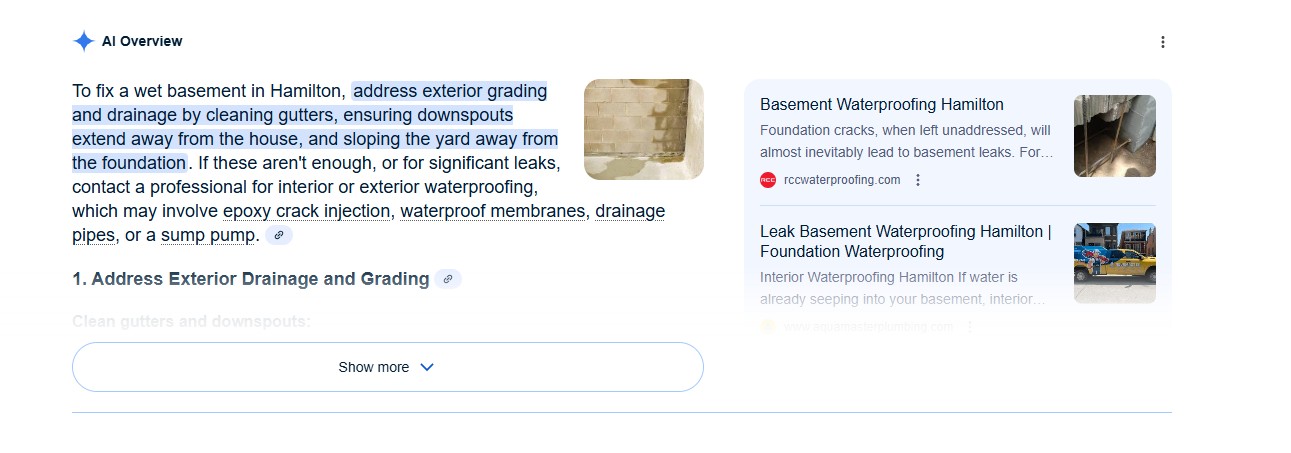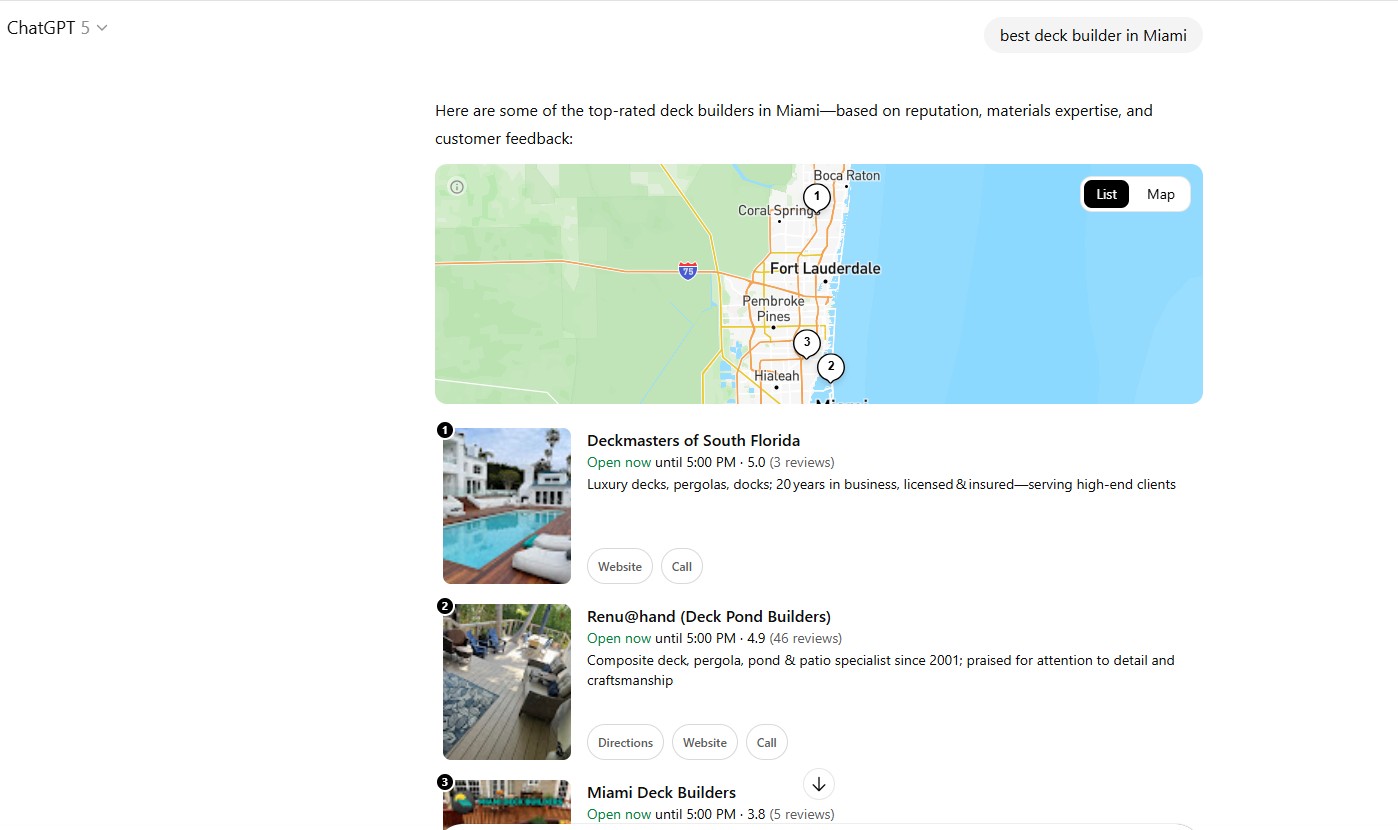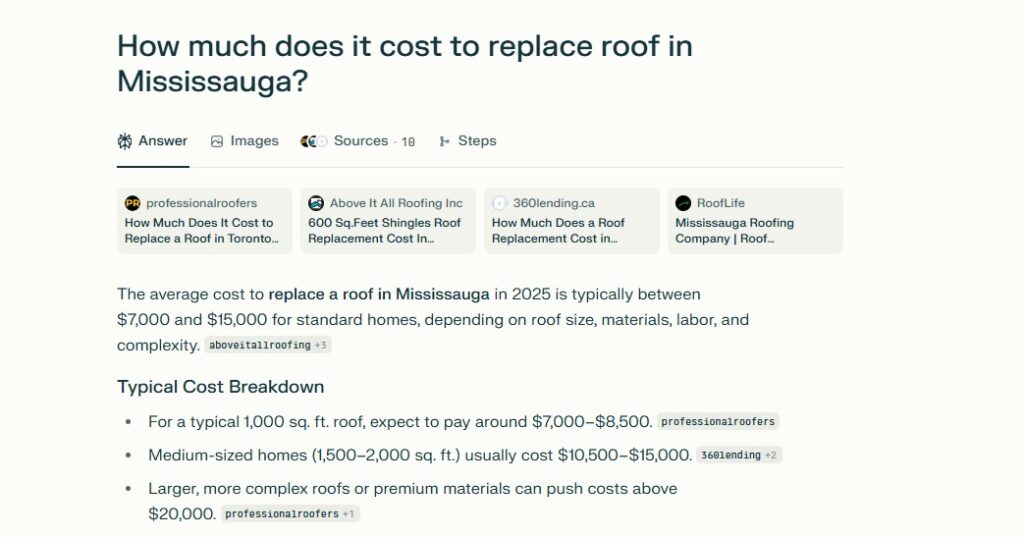The way homeowners search for contractors is changing. In 2025, they’re no longer just typing questions into Google. Instead, they’re turning to AI tools like ChatGPT, Google AI Overview, Bing Copilot, and Perplexity for fast answers. In this guide, we will explain how AI search works (at this moment) and what contractors, construction, and home-improvement companies need to do to rank on AI search.
AI search is still new and constantly changing.
What shows up today might change tomorrow, even for the same question or keyword. Visibility can vary across platforms and industries, and results often shift as these tools continue to improve.
Why AI Search Matters for Contractors, Builders & Trades Pros
Where once a simple Google search and a scroll through review sites was the norm, in 2025, homeowners are increasingly turning to AI-powered tools to ask for advice, get recommendations, find the right contractor for the job, and even book appointments.
For contractors, builders, and trade professionals, this shift represents both a massive opportunity and a serious risk. Homeowners are no longer typing “plumber near me” into a browser. Now, they have an opportunity to be more “picky” with their requests. They’re asking AI tools things like:
- “Who’s the best contractor for a small kitchen renovation in [my town]?”
- “Can I get a licensed builder who does eco-friendly upgrades around here?”
- “Find me a roofer with good reviews who’s available next week.”
In response, AI tools compile and synthesize content from across the web, selecting answers based on company authority, content clarity, and trustworthiness of the business. And since AI has already done all the research and comparison, homeowners may not do any additional research.
That means:
- If your business is listed in trusted sources
- If your content answers specific homeowner questions
- If your brand is mentioned across the web in relevant contexts
Then AI may recommend your company first, and the homeowner may never look any further. So if you want to get more leads for your construction business, you need to appear on the AI search.
Types of AI Search Tools Contractors Need to Know
If you’re a builder, contractor, or renovation pro, it’s important to know where your potential customers are searching and how those platforms decide which names to recommend.
Google AI Overviews
Google’s AI Overviews (AOVs) appear at the very top of search results, above the blue links.
- Found at the top of traditional Google searches.
- Summarizes complex queries and cites web sources.
- Powered by Google’s Gemini LLM.
- Prioritizes well-structured, helpful, and current content.

First, users will see a short paragraph summarizing the answer. But if the user clicks “Show more”, the overview expands into a deeper breakdown, with extra details, related points, and, most importantly, the list of sources Google used.
For contractors, this is a major opportunity: even if your website isn’t ranked #1 on Google, a well-structured page can still be pulled into the AI overview if it answers the query clearly.
Key Takeaway: A basement waterproofing page ranking in position seven might still be cited as a top source for “how to fix a wet basement in Hamilton.”
ChatGPT (via Bing)
Users with a paid Pro account of ChatGPT can use a browsing-enabled mode, which pulls in live data powered by Bing.
- Combines its own training data with Bing’s search index.
- Provides conversational, step-by-step style answers.
- Prefers well-cited, structured content with authority.
- Will cite sources when using Browse with Bing.
If many blogs, directories, and articles reference your business for “best deck builder in Miami,” ChatGPT may recommend you, even if you’re not ranking #1.

ChatGPT is doing more than just analyzing your website; it’s looking at your company’s entire digital presence. To show up in AI-generated answers, your business needs consistent brand mentions across industry-related third-party platforms like Houzz, Homestars, Yelp, Angi, and niche blogs.
You also need to demonstrate topical authority by publishing in-depth, expert-level content on your core services (e.g., basement waterproofing, home addition costs). And importantly, your website must be optimized and indexed by Bing, not just Google, so your business can appear in up-to-date answers.
Key Takeaway: Strong Bing SEO + wide brand presence = better ChatGPT visibility.
Perplexity AI
Perplexity is a growing AI search engine designed specifically for quick answers that always cites its sources.
- Research-style interface.
- Combines web browsing, citations, and natural language summarizing.
- Very citation-heavy, favors expert-level, original content.
- Great for local cost guides, comparisons, how-tos, and analysis.
A “Complete Guide to Roof Replacement Costs in Mississauga” with tables, permit info, and warranty details could be cited across multiple parts of a Perplexity answer.

When users ask Perplexity about a home improvement service, the tool breaks the question into smaller searches and compiles the answers. It always shows which sites it used, giving contractors a direct chance to be credited. If you publish high-quality, local content (like renovation costs, timelines, or step-by-step guides), Perplexity is more likely to reference your site.
Key Takeaway: Perplexity values strong topic coverage and visible authority of the company. Pages that answer multiple related questions in one place have the best shot at being cited.
Voice Assistants (Google Assistant, Alexa, Siri)
Voice assistants are increasingly used for local service searches, often phrased as conversational requests.
- Found on smartphones, smart speakers, and in-car systems.
- Queries are almost always spoken in full sentences or questions.
- Pull results from local search indexes and knowledge graphs.
- Depend heavily on directory listings, reviews, and structured data.
When a homeowner says, “Hey Google, who’s the best electrician near me?” the assistant relies on Google Business Profile, Apple Maps, Yelp, and other directory data to suggest names. Voice assistants prioritize verified listings, recent reviews, and consistency across platforms.
Example: If a home builder in Palo Alto has a complete Google Business Profile with services listed, photos of recent projects, and solid reviews, Google Assistant is more likely to suggest them when someone asks, “Who builds new homes in Palo Alto?”
Key Takeaway: Voice assistants reward strong local SEO. Keep your business profiles, directories, and schema accurate and current.
What This Means for Contractors
No single AI tool works the same way.
- Google’s AI Overviews lean on page-one rankings.
- ChatGPT rewards businesses with strong brand mentions across the web.
- Perplexity favors detailed, expert guides.
- Voice assistants rely on accurate local listings and reviews.
For contractors, this means your strategy can’t rely on one channel alone. You need:
- Solid SEO foundations
- Consistent brand
- Strong social media
- Clear, detailed content
- Strong local signals
The more angles you cover, the more likely AI Search will choose your construction business.
How Contractors Can Rank in AI Search
AI search doesn’t follow traditional SEO rules, but it still depends on strong SEO foundations. The difference is that AI systems read and recombine information in ways that make quality signals even more important. To rank on AI, your website content must be easy to crawl, structured for machines to interpret, and backed by clear signals of authority and trust.
Here’s how it works and what contractors need to do to rank in AI Search:
Website Crawlability & Indexing
If AI tools can’t access your site, you won’t show up. This step is non-negotiable, and that is why it is first on the list.
All contractors must ensure that their website is
- Indexable by Google and Bing
- The robots.txt file allows GPTBot, Bingbot, and Googlebot
- Pages aren’t hidden behind JavaScript or pop-ups
- Internal linking connects all key service pages
Key Takeaway: If your site is only indexed on Google, ChatGPT (which uses Bing) might never see your business.
Schema Markup Helps AI Understand Context
Schema markup helps AI understand what your content means. It’s how you tell search engines, “This is our service area,” or “This is a verified customer review.”
Must-have schema for contractors:
- LocalBusiness (name, address, phone, hours, service areas)
- Reviews (showcase ratings from real clients)
- FAQ (mark up question–answer blocks)
- Service (define exactly what you offer, e.g. “Crown Moulding Installation”)
Want to check if your schema is set up correctly? Use Google’s Structured Data Testing Tool.
Need help creating schema from scratch? Try the Google Markup Helper, which generates the code for you.
Key Takeaway: Schema doesn’t guarantee placement, but without it, your pages are harder for AI to categorize and quote.
Structured & Quality Content
AI prefers clean, easy-to-read layouts. Walls of text get ignored. Pages that are broken into clear sections with proper headings, bullet points, and labeled FAQs are far more likely to be cited.
What contractors should do:
- Use question-based H2/H3 headings: “How much does a kitchen renovation cost?”
- Add bullet lists for materials, steps, or benefits
- Include photos with alt text, project timelines in tables, and process diagrams where possible
- Add a detailed FAQ to every major service page
Key Takeaway: A heading like “How long does a bathroom remodel take in Ottawa?” followed by a direct 2-sentence answer is AI gold.
What Content Should Contractors Publish to Rank in AI?
To become a trusted source and rank on AI search results, you need to demonstrate deep, structured knowledge around your most important services and topics related to these services.
This is called topical authority, and it’s one of the strongest signals that AI models use to recommend your business. Topical authority means you become a go-to expert on one or multiple topics in your industry.
For example, instead of a single page on “bathroom renovations,” you break the topic into separate, linked pages that each address a core question like:
- How Much Does a Bathroom Remodel Cost in [City]?”
- “What Permits Are Required for Bathroom Renovations in [Province/State]?”
- “Best Materials for Bathroom Flooring, Walls, and Fixtures (2025)”
- “Step-by-Step Timeline for a Full Bathroom Remodel”
- “Before & After: Bathroom Renovations with Budgets and Photos”
- “Should You Renovate or Expand Your Bathroom? Pros & Cons”
This strategy works because AI tools look for expert answers for the topic, full coverage and clarity. If your domain repeatedly shows up in answers about “kitchen remodel costs,” “cabinet options,” and “kitchen permits,” the model is more likely to trust your site as a reliable authority and cite it.
Expert Advice: Go Deep, Not Broad
Instead of trying to rank for every type of renovation, focus on one vertical at a time — like basements, kitchens, or additions. Go deep, build clusters, earn brand mentions, and get cited. Once you’ve gained traction, repeat the same strategy in your next service category.
How Authority and Brand Mentions Help Contractors Rank in AI Search
AI search tools scan the entire web to decide whether your business is trustworthy. That decision is based on two key things:
Authority Signals Contractors Need
To prove expertise and reliability, contractors should:
- Collect and showcase reviews with local keywords
- Publish location-specific, expert content (e.g., “2025 Kitchen Remodel Costs in Toronto: Permit + Material Guide”)
- Get listed on trusted platforms: Houzz, Homestars, Yelp, Angi, BBB, and other directories
Why Brand Mentions Matter
In traditional SEO, backlinks were the gold standard. But AI search engines work differently. Large language models like Gemini and ChatGPT learn associations between company names and services.
Example:
- “123 Builders” + “best kitchen upgrades”
- “123 Builders” + “affordable kitchen renovation in Ottawa”
If those pairings show up consistently in blogs, directories, reviews, and news sites, AI tools treat them as naturally linked. So when a homeowner asks, “Who’s the best affordable bathroom remodeler in Ottawa?”, your brand has a much better chance of appearing.
Important: The more times your business is mentioned online in connection with a specific service, the stronger that association becomes in the AI “brain.”
9 Online Mentions Every Contractor Should Have for AI Rankings
Getting mentioned in the right places online makes it easier for AI tools to connect your contracting business with your services.
Here’s the visibility checklist, organized by priority:
Highest Priority (Essential)
- Google Business Profile (GMB)
Core local visibility. AI tools, voice assistants, and traditional search all pull from your GMB profile. Without it, you’re nearly invisible locally. - “Best of” Lists and Roundups
Strong brand mentions in trusted, crawled sources like Houzz, Angi, Yelp, or local blogs feed directly into AI associations. - Community Stories with a Human Hook
Local media mentions (charity builds, unique projects) are powerful trust signals and often reused in AI training data. - Better Business Bureau (BBB) Profile
Adds legitimacy and trustworthiness, A Better Business Bureau profile is a strong trust signal that AI tools notice.
Medium Priority (Good for Growth)
- Expert Contributions and Guest Posts
Share insights on blogs or trade sites - Forums and Social Platforms
Answer homeowner questions on Reddit, Quora, or Facebook groups. - LinkedIn Company Page
Your LinkedIn page adds credibility; more useful if you do commercial or B2B work.
Lower Priority (Nice-to-Haves)
- Wikidata Listing
Very useful long-term, but the setup is technical. AI tools crawl it, but many contractors won’t get there until they’ve nailed the basics. - Crunchbase Profile
This profile is more relevant for larger firms, franchises, or contractors expanding regionally. Low direct value for small local shops.
Key Takeaway: The more consistent mentions and listings your business has across trusted platforms, the easier it is for AI tools to connect your name with your services.
Final Thoughts: Getting Your Contracting Business Seen in AI Search
AI search is changing how homeowners find and choose contractors. Google’s AI Overviews lean on page-one results, ChatGPT rewards businesses with strong brand mentions, Perplexity favors in-depth guides, and voice assistants rely on local profiles and reviews.
The message is clear: no single tactic will win on its own.
AI doesn’t replace SEO, it builds on it. Contractors who start adapting now will be the ones recommended first when homeowners ask, “Who’s the best remodeler near me?”
Our team helps contractors and trades pros create content and authority signals that get noticed by both people and AI tools. Book your AI Visibility consultation today.
Frequently Asked Questions
Right now, AI search tracking is limited. You can test it manually by asking AI tools types of questions your clients might ask, then checking if your business appears or is cited as a source. Some SEO tools (like Surfer or Semrush) are beginning to offer AI visibility trackers.
Make sure your Google Business Profile and Bing Places are complete and accurate, with reviews, photos, and services listed. These are quick wins for both AI Overviews and voice assistants. At the same time, add FAQs and cost ranges to your service pages – these often get cited directly in AI summaries.
Yes. Reviews are trust signals that appear across Google, Bing, and directories like Yelp, Houzz, and Homestars. AI tools pull from these sources, and consistent positive reviews increase the chance your company will be recommended.
Yes, but indirectly. AI tools scan the entire web, and consistent brand mentions across platforms (Facebook, Instagram, LinkedIn, TikTok, YouTube) can strengthen your authority signals. If your posts are shared, quoted, or embedded on other websites, those mentions can reinforce the connection between your brand and your services inside AI models. Social media alone won’t get you cited, but it helps create the digital footprint AI tools rely on.
AI tools can adjust answers based on context. If you’ve used a chatbot like ChatGPT before and it knows you own or work for a certain company, it may exclude your business from the results because it assumes you’re already aware of your services and are likely researching competitors. This doesn’t mean your company isn’t showing up for other users—it just means the AI is personalizing the response for you.
Absolutely. When you explain which permits are needed for a basement finish in Toronto or the electrical code requirements for a 200A panel, it shows authority and expertise. AI tools are more likely to pull from pages that include compliance details because they read as credible and trustworthy sources.
Yes. Homeowners often search AI tools for cost comparisons. If your page includes clear price ranges, financing options, or “what affects cost” breakdowns, it gives AI quotable material. For example, “A home addition in Palo Alto typically costs $150,000–$450,000 depending on square footage, permits, and finishes” is exactly the kind of snippet AI likes to cite.